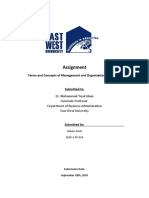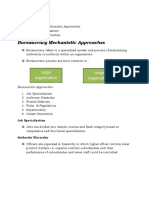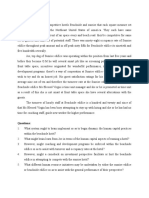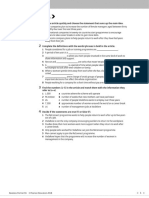Topic-Based (FAQ) - CHAPTER 1: Bureaucracy, Specific Form of Organization Defined by Complexity, Division of Labour
Topic-Based (FAQ) - CHAPTER 1: Bureaucracy, Specific Form of Organization Defined by Complexity, Division of Labour
Uploaded by
Tanya GrewalCopyright:
Available Formats
Topic-Based (FAQ) - CHAPTER 1: Bureaucracy, Specific Form of Organization Defined by Complexity, Division of Labour
Topic-Based (FAQ) - CHAPTER 1: Bureaucracy, Specific Form of Organization Defined by Complexity, Division of Labour
Uploaded by
Tanya GrewalOriginal Title
Copyright
Available Formats
Share this document
Did you find this document useful?
Is this content inappropriate?
Copyright:
Available Formats
Topic-Based (FAQ) - CHAPTER 1: Bureaucracy, Specific Form of Organization Defined by Complexity, Division of Labour
Topic-Based (FAQ) - CHAPTER 1: Bureaucracy, Specific Form of Organization Defined by Complexity, Division of Labour
Uploaded by
Tanya GrewalCopyright:
Available Formats
Topic-based (FAQ) – CHAPTER 1
Question 1 What is Personnel Administration?
It is called by different names such as Personnel Management, Manpower
Management, Labour Management, Labour Relations, Industrial Relations,
Answer Employees Relations, Human Resource Management, etc. this study of Personnel
Administration became popular from 1930s.
Question 2 What is Bureaucracy?
Bureaucracy, specific form of organization defined by complexity, division of labour,
permanence, professional management, hierarchical coordination and control, strict
Answer
chain of command, and legal authority.
Question 3 Explain Weber; a model of Bureaucracy.
Max Weber, a German scientist, defines bureaucracy as a highly structured,
formalized, and also an impersonal organization.
• In his 1922 masterpiece, Economy and Society, Weber described many ideal
types of public administration and governance.
Answer • His critical study of the bureaucratization of society was one of the most
enduring parts of this work.
• It was Weber who began the study of bureaucracy and whose works led to
the popularization of this term.
Question 4 What are the Major principles of Max Weber’s bureaucratic ?
Major principles of Max Weber’s bureaucratic form-
• A formal hierarchical structure
• Rules-based Management
• Functional Specialty organization
Answer
• Up-focused or In-focused Mission
• Impersonal
• Employment-based on Technical Qualifications
Question 5 Explain two Merits of Bureaucracy.
• Workers become experts because of the division of labor and duties, and
their performance is improved considerably, which becomes helpful for the
bureaucratic organization to provide an improved output.
Answer
• A greater amount of consistency is seen in the employees of a bureaucratic
organization because of the rules and procedures which are pre-decided for
every work.
Topic-based (FAQ) – CHAPTER 2
Question 1 What is recruitment?
Recruitment refers to the process of identifying, attracting, interviewing, selecting,
hiring and on-boarding employees. In other words, it involves everything from the
Answer
identification of a staffing need to filling it.
Question 2 Explain the importance of recruitment.
• When the right people are selected, the employee will produce productive
results and stay with the organisation longer hence having a low employee
turnover.
• If selection is not carefully done, the employee may make mistake which
Answer
leads to a financial loss.
• It also wastes the time of human resource managers to go through the
recruitment and selection process again.
Question 3 What is contingency recruiting?
Contingency Recruiting: like retained recruiting, contingency recruiting requires an
outside firm. Unlike retained recruiting, there is no upfront fee with contingency.
Answer
Instead, the recruitment company receives payment only when the clients they
represent are hired by an organization
Question 4 Explain promotion.
Promotions refer to shifting of persons to positions carrying better prestige, higher
responsibilities and more pay. The higher positions falling vacant may be filled up
Answer from within the organisation. A promotion does not increase the number of persons
in the organisation.
Question 5 What is seniority?
Seniority is a privileged rank based on your continuous employment with a
company. In a seniority-based system, people who stay at the same company for
long periods of time are rewarded for their loyalty. You can distinguish seniority
Answer
from merit-based advancement because seniority is based only on a person's
employment duration without considering other factors, such as accomplishments.
Topic-based (FAQ) – CHAPTER 3
Question 1 What is position classification?
A position connotes a set of duties or responsibilities assigned to the employee. The
Answer position at a given time may be occupied or vacant and immaterial for purpose of
classification.
Question 2 What are the advantages of rank classification?
Advantages:
• Flexible, so personnel can be transferred across departments.
• More emphasis on generalists
Answer • Faster to classify.
• Promotes loyalty to service and not a department.
• Attracts competent people.
Question 3 What is conduct rules?
Conduct rules state the principles that the government expects from its employees.
Answer It applies to both his personal life and official life. If such rules are violated then he
may face warning, departmental actions and disciplinary proceedings
Question 4 What is Disciplinary actions?
According to Dr. Spriegel, "Disciplint is the force that prompts an individual or a to
observe the rules, regulations and procedures which are deemed to be necessary to
the attainment of an objective, it is force or fear of force which restrains an
Answer individual or a group from doing things which are deemed to be destructive of group
objectives. It is also the exercise of restraint or the-enforcement of penalties for the
violation of group regulations."
Question 5 What are the salary benefits?
There are various methods of fixing up salaries of the public servants, each country
follows a different method of pay fixation. It is determined by her past traditions,
administrative patterns, nature of her constitution and character of the people.
Answer Salaries are fixed by statute of the legislature. This system prevails in countries
having immature personnel systems, such as Middle Eastern countries, and in local
bodies and small cantons.
Topic-based (FAQ) – CHAPTER 4
Question 1 What is employee right?
Employment law covers all rights and obligations within the employer-employee
relationship, including not only current employees but also former employees and
Answer job applicants. Many of the legal disputes involving businesses are related to
employee rights and regulations.
Question 2 What is Right to Association?
Freedom of association is the right of workers and employers to freely form and join
Workers Organisations such as trade unions, worker associations and worker
councils or committees for the promotion and defence of occupational interests.
Answer
The right to freedom of association is proclaimed in the Universal Declaration of
Human Rights.
Question 3 What is right strike?
The right to strike is a statutory right in India guaranteed under Section 22(1)(a) of
the Industrial Disputes Act, 1957. The section provides that in case of breach of
Answer contract in public utility service, the workers can go for the strike with a prior notice
to be given to the employer within 6 weeks of such strike.
Question 4 What is negotiation?
Negotiation is a method by which people settle differences. It is a process by which
compromise or agreement is reached while avoiding argument and dispute.
Answer
In any disagreement, individuals understandably aim to achieve the best possible
outcome for their position (or perhaps an organisation they represent).
Question 5 What is Integrity in Public Services?
Integrity of the public sector - or public integrity - refers to the use of powers and
resources entrusted to the public sector effectively, honestly and for public
purposes. Additional related ethical standards that the public sector is expected to
Answer
uphold include transparency, accountability, efficiency and competence. Integrity is
a personal choice, an uncompromising and consistent commitment to honour moral,
ethical, spiritual and artistic values and principles.
Topic-based (FAQ) – CHAPTER 5
Question 1 What is integrity?
The dictionary defines integrity as 'soundness of moral principles; the character of I
uncorrupted virtues; uprightness; honesty; sincerity, Integrity is, indeed, the most
essential attribute of a welfare state. The first five year plan rightly emphasised;
Answer
"Integrity in public affairs and administration is essential and there must, therefore, I
be an insistence on it in every branch by public activity.
Question 2 What is corruption?
In general terms, corruption may be defined as the deliberate and
intentional/exploitation of one's position, status or ,resources directly or indirectly,
for personal aggrandisement whether it be in terms of material gain or
Answer
enhancement of power, prestige or influence beyond what is legitimate or
sanctioned by commonly accepted norms to the detriment of the interests of other
persons or the community as a whole.
Question 3 Explain legal framework available.
ii) Civil Servants Conduct Rules Different categories of government. servants are
governed by separate but substantially similar, sets of conduct rules. The following
sets of rules are in force:
I) All India Services (Conduct) Rules, 1954
2) Central Civil Services (Conduct) Rules, 1955 3) Railway Services (Conduct) Rules,
Answer
1956 The Government has also made rules or issued instructions from time to time
in dealing with particular situations regarding public servants.
iii) Santhanam Committee on Prevention of Corruption The Santhanam Committee,
which was appointed in June- .
Question 4 What is CVC?
The Central Vigilance Commission has jurisdiction and powers in respect of matters
to which the executive powers of the Central Government extend. Its jurisdiction
thus, extends to all employees of the Central Government and the employees in
Answer
public undertakings, corporate bodies and other organisations dealing with any
matter falling within the executive powers of the Central Government.
Question 5 Explain two functions of CVC.
Answer It undertakes an inquiry into transaction in which a public servant is suspected or
alleged to have acted for an improper purpose or in a corrupt manner.
2) It causes an inquiry or investigation to be made into any complaint that a public
servant had exercised or refrained from exercising his/ her powers for improper or
corrupted purposes, and any complaints of corruption, misconduct, lack of integrity
of other kinds of malpractices or misdemeanour on the part of a public servant.
You might also like
- Downsizing Restructuring and OutsourcingDocument25 pagesDownsizing Restructuring and OutsourcingShibly Noman75% (8)
- Gomez-Mejia - Balkin - CardyDocument16 pagesGomez-Mejia - Balkin - Cardyargaezmoo060% (1)
- Conflict Management Training GamesDocument3 pagesConflict Management Training Gameshammad0670% (1)
- Task 1 - BSBLDR523Document6 pagesTask 1 - BSBLDR523Shivanee Jhaumal100% (1)
- ManagementDocument3 pagesManagementStella LucasNo ratings yet
- Informal OrganisationDocument21 pagesInformal Organisationaryan singhNo ratings yet
- TEMB 1107 - Chapter 5 Introduction To Management NotesDocument8 pagesTEMB 1107 - Chapter 5 Introduction To Management NotesNaduku EridadiNo ratings yet
- Principles of Management Final Exam by MEHDI SHAH RASHDIDocument9 pagesPrinciples of Management Final Exam by MEHDI SHAH RASHDIMuhram HussainNo ratings yet
- SPM Unit 5 NotesDocument25 pagesSPM Unit 5 NotesMAYANK RAGHAVNo ratings yet
- Unit-V Managing People and Organizing Teams 16 Marks 1Document24 pagesUnit-V Managing People and Organizing Teams 16 Marks 1VidhyaNo ratings yet
- Management Theory and Organisational BehaviorDocument42 pagesManagement Theory and Organisational Behaviorkadheejarahma66No ratings yet
- MGNTDocument4 pagesMGNTAanyaNo ratings yet
- SPM Unit 5 NotesDocument26 pagesSPM Unit 5 Notesabhishekgs100% (3)
- Organizational BehaviorDocument8 pagesOrganizational BehaviorMaruf AhmedNo ratings yet
- Lecture Notes - Motivation Theories, Methods & ProgramsDocument6 pagesLecture Notes - Motivation Theories, Methods & ProgramsJesNo ratings yet
- BAM040 (Apr 21 - Sep 21) Exam Indicative ResponsesDocument7 pagesBAM040 (Apr 21 - Sep 21) Exam Indicative ResponsesAhamed NuzhanNo ratings yet
- mngt6 Mod. 1Document3 pagesmngt6 Mod. 1Melody MadarraNo ratings yet
- BBM1201 Principles of ManagementDocument8 pagesBBM1201 Principles of Managementwriter bestNo ratings yet
- Exam Paper 2022Document7 pagesExam Paper 2022Eliza VooNo ratings yet
- Organisation BehavourDocument9 pagesOrganisation BehavourNageshwar SinghNo ratings yet
- International Business Assognment 2Document7 pagesInternational Business Assognment 2Mohammed RaselNo ratings yet
- Organizational Behavior TopicsDocument10 pagesOrganizational Behavior Topicsজুবায়ের আমিনNo ratings yet
- Mgt3219e Final ExamDocument5 pagesMgt3219e Final ExampavitthiraNo ratings yet
- Bunagan, Keith Clarence - Psy 204Document14 pagesBunagan, Keith Clarence - Psy 204Keith Clarence BunaganNo ratings yet
- Assignment 2 HRDocument10 pagesAssignment 2 HRjaspreet46No ratings yet
- Human Resource Management ASSIGNMENT 1 AND 2 ANSWER SHEETDocument12 pagesHuman Resource Management ASSIGNMENT 1 AND 2 ANSWER SHEETarifNo ratings yet
- Chapter 7 MOTIVATING AND REWARDING EMPLOYEEDocument43 pagesChapter 7 MOTIVATING AND REWARDING EMPLOYEEsarahnicolejaconesbarsubiaNo ratings yet
- 43 SAT-2 From Vikash AgrawalDocument9 pages43 SAT-2 From Vikash AgrawalVikash AgrawalNo ratings yet
- MotivationDocument4 pagesMotivations17005832No ratings yet
- SPM Assignment 5Document11 pagesSPM Assignment 5ashadahmedpablaNo ratings yet
- Chapter 4Document26 pagesChapter 4Gizaw BelayNo ratings yet
- B202-A Important Points As of November 21 2011 PDFDocument5 pagesB202-A Important Points As of November 21 2011 PDFalblaise30No ratings yet
- BE & CSR Chapter 3. Muluadam Alemu, 2023Document31 pagesBE & CSR Chapter 3. Muluadam Alemu, 2023muluadamNo ratings yet
- Human Resource Part 2 CompleteDocument7 pagesHuman Resource Part 2 CompleteKamalakshya SahaNo ratings yet
- Ethics (Activity 9)Document4 pagesEthics (Activity 9)Alyssa AlejandroNo ratings yet
- Human RelationsDocument29 pagesHuman RelationsVaibhav KannavNo ratings yet
- F1 Short QuestionsDocument12 pagesF1 Short QuestionsThu Trang TranNo ratings yet
- 07.1 - Employee Socialization & OrientationDocument25 pages07.1 - Employee Socialization & OrientationMkh SelimNo ratings yet
- Human Resource ManagementDocument14 pagesHuman Resource ManagementChander KhatriNo ratings yet
- Richard D. CalhoonDocument11 pagesRichard D. CalhoonGazzy SinghNo ratings yet
- Basic Motivation Concepts: By:Dr Ipseeta Satpathy, D.Litt Professor Ob & HRMDocument30 pagesBasic Motivation Concepts: By:Dr Ipseeta Satpathy, D.Litt Professor Ob & HRMPRAGYAN PANDANo ratings yet
- WIN SEM (2023-24) FRESHERS - MGT1031 - TH - AP2023247000372 - 2024-03-12 - Reference-Material-IDocument47 pagesWIN SEM (2023-24) FRESHERS - MGT1031 - TH - AP2023247000372 - 2024-03-12 - Reference-Material-IHello MotoNo ratings yet
- Module 3-MobDocument36 pagesModule 3-MobAkshitha KulalNo ratings yet
- Ajwan HablainDocument11 pagesAjwan HablainHuuiiNo ratings yet
- Unit 3 Motivation: DEFINITIONS OF MOTIVATION: According To Robert Dubin, "Motivation Is TheDocument12 pagesUnit 3 Motivation: DEFINITIONS OF MOTIVATION: According To Robert Dubin, "Motivation Is TheHarpreet SinghNo ratings yet
- The Effect of Motivational Tools On Employees MoralsDocument17 pagesThe Effect of Motivational Tools On Employees MoralsOli AhmedNo ratings yet
- Motivation and OrganisationDocument8 pagesMotivation and OrganisationChaitanya PanseNo ratings yet
- VIVA All FinalDocument103 pagesVIVA All FinalBharani Sai PrasanaNo ratings yet
- Management Concepts & Practices Assignment: 5Document8 pagesManagement Concepts & Practices Assignment: 5sourabh_themagicmanNo ratings yet
- Internet Recruiting IssuesDocument3 pagesInternet Recruiting IssuesNgary SamNo ratings yet
- Quality of Work Life Project ReportDocument95 pagesQuality of Work Life Project ReportchinnidurgaNo ratings yet
- Chapter-3 - Motivation From Concept To ApplicationsDocument34 pagesChapter-3 - Motivation From Concept To Applicationshajar ouabiNo ratings yet
- Chapter 3 NotesDocument8 pagesChapter 3 NotesNoemie DelgadoNo ratings yet
- Assignment On Disciplining The Problem EmployeeDocument12 pagesAssignment On Disciplining The Problem EmployeeRinku AlamgirNo ratings yet
- Presentation 02 Lecture HUMN 501Document35 pagesPresentation 02 Lecture HUMN 501srede565No ratings yet
- CH 8 - 0Document5 pagesCH 8 - 0wube100% (1)
- Managerial Functions Operative Functions: Human Resource Management (HRM)Document46 pagesManagerial Functions Operative Functions: Human Resource Management (HRM)AbdullahNo ratings yet
- Chapters 7 & 8: Basic Motivation Concepts & Its ApplicationDocument28 pagesChapters 7 & 8: Basic Motivation Concepts & Its ApplicationSarfaraj Ovi100% (1)
- Organizational ManagementDocument10 pagesOrganizational ManagementSk jahidul IslamNo ratings yet
- Ob Questions and Answers-1Document29 pagesOb Questions and Answers-1Soni VatsalNo ratings yet
- Bureaucracy Mechanistic Approaches: Large Organization Large OrganizationDocument7 pagesBureaucracy Mechanistic Approaches: Large Organization Large OrganizationSamKris Guerrero MalasagaNo ratings yet
- Associate Training Manual: Ethical Leadership and Customer Service Development for Law Enforcement Professionals, (Sworn and Civilian)From EverandAssociate Training Manual: Ethical Leadership and Customer Service Development for Law Enforcement Professionals, (Sworn and Civilian)No ratings yet
- DK Essential Managers: Motivating People: Inspiring, Empowering, Team Building, Goal Setting, RewardingFrom EverandDK Essential Managers: Motivating People: Inspiring, Empowering, Team Building, Goal Setting, RewardingNo ratings yet
- Advertising at Unit 4Document87 pagesAdvertising at Unit 4Tanya GrewalNo ratings yet
- Research Methodology: UNIT-1Document15 pagesResearch Methodology: UNIT-1Tanya GrewalNo ratings yet
- Human Resource Management Quiz 1 Case STDocument3 pagesHuman Resource Management Quiz 1 Case STTanya GrewalNo ratings yet
- Personnel Administration: UNIT-3 Rank and Position ClassificationDocument14 pagesPersonnel Administration: UNIT-3 Rank and Position ClassificationTanya Grewal100% (1)
- Personnel Administration: UNIT-2 RecruitmentDocument17 pagesPersonnel Administration: UNIT-2 RecruitmentTanya GrewalNo ratings yet
- Caselet - HRMDocument3 pagesCaselet - HRMTanya GrewalNo ratings yet
- Caselet - Production ManagementDocument2 pagesCaselet - Production ManagementTanya GrewalNo ratings yet
- Marketing Management: UNIT-3Document11 pagesMarketing Management: UNIT-3Tanya GrewalNo ratings yet
- Marketing Management: UNIT-5Document14 pagesMarketing Management: UNIT-5Tanya GrewalNo ratings yet
- Marketing Management: UNIT-4Document15 pagesMarketing Management: UNIT-4Tanya GrewalNo ratings yet
- Marketing Management: UNIT-2Document15 pagesMarketing Management: UNIT-2Tanya GrewalNo ratings yet
- Human Resource Management: UNIT-3 Training and Executive DevelopmentDocument14 pagesHuman Resource Management: UNIT-3 Training and Executive DevelopmentTanya GrewalNo ratings yet
- Human Resource Management: UNIT-4 Sustaining Employee InterestDocument16 pagesHuman Resource Management: UNIT-4 Sustaining Employee InterestTanya GrewalNo ratings yet
- Green Marketing-Complete PaperDocument10 pagesGreen Marketing-Complete PaperTanya GrewalNo ratings yet
- Telecom Sector in IndiaDocument92 pagesTelecom Sector in IndiaTanya GrewalNo ratings yet
- IT and Financial Compliance: Closing The Gaps in Sarbanes-Oxley April 19, 2005 Steve Greenstein / Rudy KisteDocument24 pagesIT and Financial Compliance: Closing The Gaps in Sarbanes-Oxley April 19, 2005 Steve Greenstein / Rudy KisteTanya GrewalNo ratings yet
- 1 Job Analysis of Assistant HRMDocument6 pages1 Job Analysis of Assistant HRMRida RafiqNo ratings yet
- PHD Thesis On Employee RetentionDocument5 pagesPHD Thesis On Employee Retentionsamanthajonessavannah67% (3)
- Mar 2024 PT PreseenDocument7 pagesMar 2024 PT PreseenLoveFattyNo ratings yet
- Petitioner Vs Vs Respondent Vicente Hilado, Pedro Lopez Artemio A. Almendral Sanidad, Ayson & CasiaDocument3 pagesPetitioner Vs Vs Respondent Vicente Hilado, Pedro Lopez Artemio A. Almendral Sanidad, Ayson & CasiaChristine Joy PamaNo ratings yet
- The Entrepreneur Group 3Document27 pagesThe Entrepreneur Group 3JOSE RAYNo ratings yet
- 202302081675850875-The Khyber Pakhtunkhwa Contributory Provident Fund Rules, 2022Document11 pages202302081675850875-The Khyber Pakhtunkhwa Contributory Provident Fund Rules, 2022TaiMurTXaibNo ratings yet
- Bursaries 2024Document1 pageBursaries 2024mphomolele28No ratings yet
- Baker Commodities Agreement 2016 - 2019 PDFDocument27 pagesBaker Commodities Agreement 2016 - 2019 PDFUFCW770No ratings yet
- Bus Part B1 ReadingBank U1Document2 pagesBus Part B1 ReadingBank U1JovanaNo ratings yet
- CASE OF RADU v. THE REPUBLIC OF MOLDOVADocument12 pagesCASE OF RADU v. THE REPUBLIC OF MOLDOVAneritanNo ratings yet
- Reliance CommunicationDocument50 pagesReliance Communicationkumaratdbg100% (7)
- OGC Annual Report 10Document19 pagesOGC Annual Report 10sathishNo ratings yet
- Far East V LibatiqueDocument3 pagesFar East V Libatiqueivan markNo ratings yet
- Role of Stakeholders in Construction Safety: Different Stakeholders Have Specific Roles in Preventing AccidentsDocument6 pagesRole of Stakeholders in Construction Safety: Different Stakeholders Have Specific Roles in Preventing AccidentsBhuvanaNo ratings yet
- Employment Application Form: Accenture Services Private LTDDocument5 pagesEmployment Application Form: Accenture Services Private LTDThomas MorrisNo ratings yet
- 10.1007 - s10672 007 9044 0Document20 pages10.1007 - s10672 007 9044 0ياسر الجابريNo ratings yet
- 2 Hisoler III v. Filipino Travel Center CorpDocument2 pages2 Hisoler III v. Filipino Travel Center CorpKEDNo ratings yet
- A Critical Review of Theoretical Aspects of StrateDocument17 pagesA Critical Review of Theoretical Aspects of StrateIn-In JaiNo ratings yet
- List of AmcDocument2,920 pagesList of AmcDipesh32% (38)
- Gov. Roy Cooper's BudgetDocument285 pagesGov. Roy Cooper's BudgetSteven DoyleNo ratings yet
- A Schematic Diagram On The Changes of RA 8042 As Amended by RA 10022Document29 pagesA Schematic Diagram On The Changes of RA 8042 As Amended by RA 10022Kristian Caumeran100% (1)
- Now Discover Your StrengthsDocument4 pagesNow Discover Your StrengthsRares ApastasoaieiNo ratings yet
- Hunton IT Audit Appendix BDocument9 pagesHunton IT Audit Appendix BMary Doriethy Yema Ibarra100% (1)
- Research in Daily Life 2 1Document29 pagesResearch in Daily Life 2 1Rey Ann Peña100% (1)
- Unilever 'S Human Rights Policy StatementDocument4 pagesUnilever 'S Human Rights Policy StatementAmiibahNo ratings yet
- The Best HR KPIs Aligned With Company StrategyDocument6 pagesThe Best HR KPIs Aligned With Company StrategyLOBOCRISPNo ratings yet
- The Problem Background of StudyDocument45 pagesThe Problem Background of StudyCary Kim AlcantaraNo ratings yet









































































































